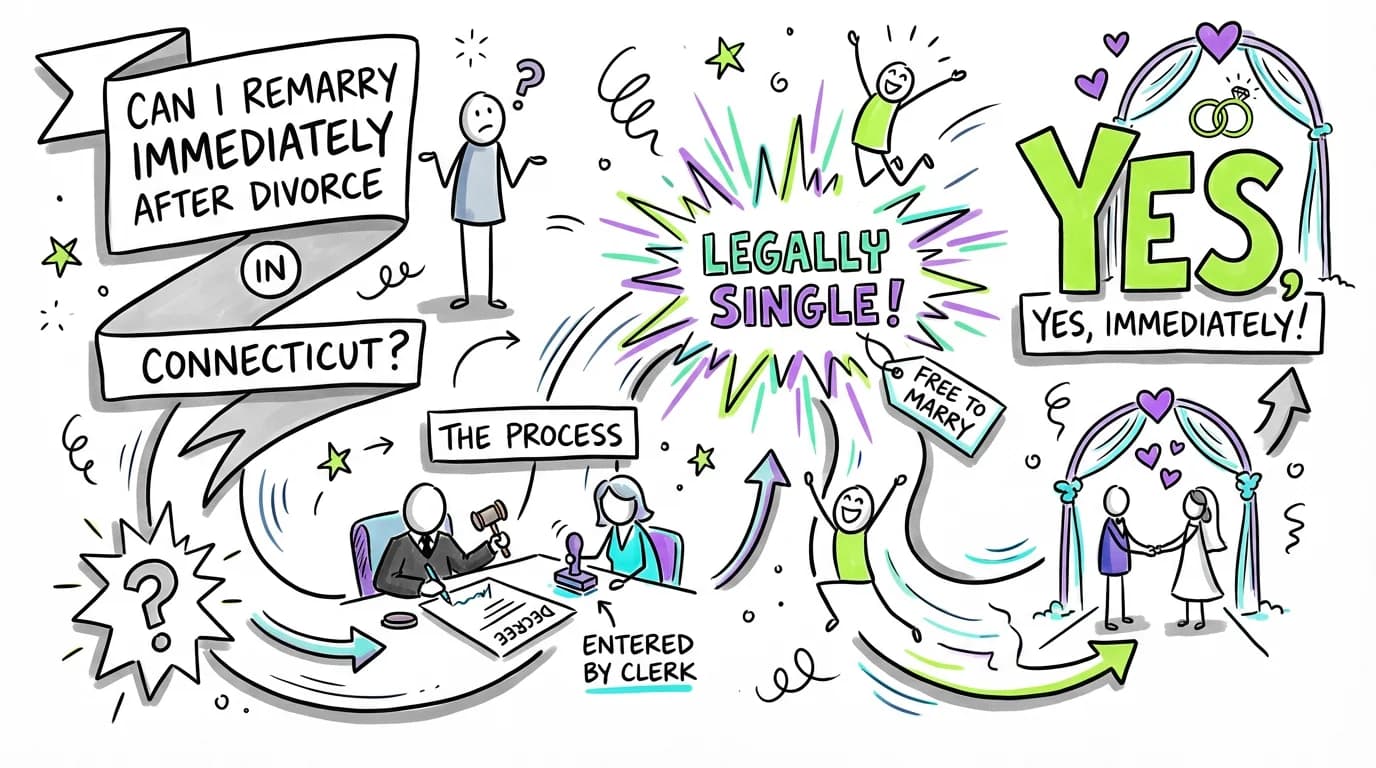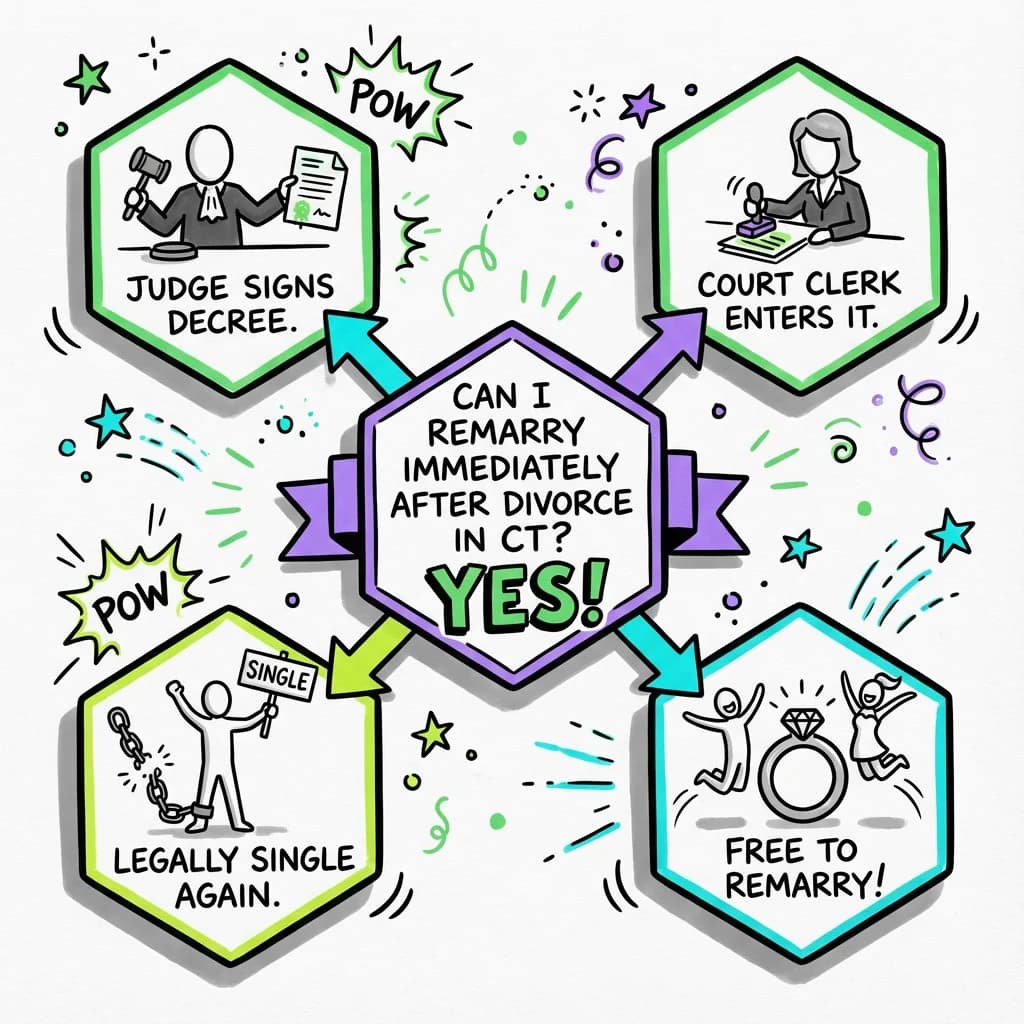Can I remarry immediately after divorce in Connecticut?
Going through a divorce is a major life event, and looking toward the future is a natural and healthy next step. If that future includes a new marriag...
Need help with your divorce? We can help you untangle everything.
Get Started Today
Going through a divorce is a major life event, and looking toward the future is a natural and healthy next step. If that future includes a new marriage, you're likely wondering about the rules. So, can you remarry immediately after divorce in Connecticut?
The short answer is yes. Once a Connecticut judge has signed your divorce decree and it has been officially entered by the court clerk, you are legally single again. At that moment, the law considers you an unmarried person, free to marry someone else.
However, while the law permits it, there are some very important practical reasons why waiting a short period might be the wiser choice. This article will walk you through the specific Connecticut laws, the process of how a divorce becomes final, and the key factors you should consider before you remarry after a divorce in Connecticut.
Understanding When Your Divorce is Truly Final
The key to being able to remarry is having your previous marriage legally dissolved. In Connecticut, this happens when the court issues a Decree of Dissolution. This is the official court order that ends your marriage.
Many people get confused about the timing. They might think the divorce is final after the 90-day waiting period or on the day of their court hearing. While these are important milestones, the legally significant moment is when the judge's order is officially entered into the court record.
The Legal Foundation in Connecticut
Connecticut law is very clear on this point. The statute governing the effect of a divorce decree states:
"A decree of annulment or dissolution shall give the parties the status of unmarried persons and they may marry again." (C.G.S. § 46b-67(c))
This single sentence is the foundation of your right to remarry. Once that decree is entered, your legal status changes from "married" to "unmarried." There is no legally mandated waiting period in Connecticut after your divorce is finalized. Unlike some other states, you don't have to wait 30, 60, or 90 days before getting a new marriage license.

The Process: From Court Hearing to Final Judgment
To understand when you can remarry, it helps to know the final steps of the divorce process:
- The Final Hearing or Agreement: Your divorce concludes either through a trial where a judge makes decisions or, more commonly, when you and your spouse reach a full agreement that a judge approves. This often happens at a final court hearing.
- The Judge's Order: At the conclusion of the hearing, the judge will grant the divorce "on the record." The judge signs the official paperwork, which includes your separation agreement if you have one. This document is the Judgment or Decree of Dissolution.
- Entry by the Clerk: The signed judgment is then given to the court clerk, who officially enters it into the court's records. This is the precise moment your divorce is legally final.
Once these steps are complete, you are officially divorced and legally free to get married again.
Important Considerations Before You Remarry After Divorce in Connecticut
While you are legally free to remarry immediately, rushing to the altar can sometimes create unexpected complications. Here are some critical factors to consider before you plan your next wedding.
1. The Appeal Period: A Strong Reason to Wait
This is the most significant practical reason to pause before remarrying. After a judge finalizes a divorce, both you and your ex-spouse have a specific window of time to file an appeal. In Connecticut, this period is typically 20 days from the date the judgment notice is sent.
Why does this matter? If you remarry during this appeal window and your ex-spouse successfully appeals the divorce, the original divorce judgment could be overturned. This would mean you were technically still married to your ex when you entered your new marriage, making the new marriage legally void.
This scenario is rare, but the legal and emotional chaos it would create is immense. To avoid this risk entirely, the safest course of action is to wait until the appeal period has expired before you remarry. An experienced family law attorney can confirm the exact date the appeal period ends in your specific case.
2. Obtaining Your Certified Divorce Decree
Before you can get a new marriage license in Connecticut (or any other state), you will need to prove that you are no longer married. The document required for this is a certified copy of your Decree of Dissolution.
You can get this document from the clerk's office at the courthouse where your divorce was finalized. It's a good idea to request several certified copies. You may need them for various purposes beyond remarriage, such as changing your name on a driver's license, passport, or bank accounts.
3. Restoring Your Former Name
Your divorce decree is also the legal tool used to restore your birth name or a former name if you requested it. According to Connecticut law, "At the time of entering a decree dissolving a marriage, the court, upon request of either spouse, shall restore the birth name or former name of such spouse" (C.G.S. § 46b-63).
Ensure your divorce decree accurately reflects your name change if you requested one. You will need the certified copy of the decree to update your name with the Social Security Administration, the DMV, and other institutions before applying for a new marriage license under your restored name.
4. Financial and Emotional Readiness
Divorce is emotionally and financially draining. Remarrying immediately can sometimes complicate financial matters, especially if there are ongoing obligations from your previous marriage, like property transfers or debt payments.
Give yourself time to adjust to your new life as a single person. Ensure you are emotionally ready for a new partnership and have a clear understanding of your own finances before joining them with someone else's.
Frequently Asked Questions About Remarrying After a Connecticut Divorce
Here are answers to some common questions people have when considering getting married again after a CT divorce.
1. Is there a mandatory waiting period after my divorce is final before I can remarry in Connecticut?
No. Connecticut law does not impose any waiting period after your divorce decree is entered. Once the judge signs the order and the clerk enters it, you are legally unmarried and can apply for a new marriage license immediately. The only "waiting" is the strong practical recommendation to let the appeal period expire.
2. What happens if I get married before my divorce is officially final?
If you get married while you are still legally married to someone else, the new marriage is considered bigamous and is legally void from the start. This can create significant legal and personal problems. It is absolutely critical to wait until your Decree of Dissolution has been entered by the court.
3. How do I prove I'm divorced when I apply for a new marriage license?
You will need to present a certified copy of your Decree of Dissolution to the town clerk where you are applying for your new marriage license. This is official proof that your previous marriage has ended.
4. Will remarrying affect the alimony I receive?
Yes, almost certainly. In Connecticut, a court can "suspend, reduce or terminate the payment of periodic alimony upon a showing that the party receiving the periodic alimony is living with another person" or remarrying (C.G.S. § 46b-86(b)). Most divorce agreements include a clause that automatically terminates alimony upon the recipient's remarriage. If you receive alimony, you should expect it to end when you get married again.
5. Does remarrying affect child support?
Remarrying, by itself, does not automatically change a child support order. Your obligation to support your children from a previous marriage is based on your income and your ex-spouse's income. However, a new spouse's income or contributions to your household expenses could be seen as a "substantial change in circumstances," which could be grounds for your ex-spouse to file a motion to modify child support. It's a complex issue that is best discussed with a family law attorney.
6. What is the difference between a legal separation and a divorce when it comes to remarriage?
This is a crucial distinction. A Decree of Legal Separation allows you to live apart and formalizes financial and custody arrangements, but it does not end the marriage. Connecticut law is explicit: a decree of legal separation means "neither party shall be free to marry" (C.G.S. § 46b-67(c)). You must first convert your legal separation into a full divorce before you can legally remarry.
7. How long does it take for a divorce to become final in Connecticut?
Connecticut has a mandatory 90-day waiting period that begins after the divorce papers are filed and returned to the court. A judge cannot grant your divorce until this period has passed (C.G.S. § 46b-67(a)). However, the total time can be much longer depending on whether your case is contested or uncontested and the court's schedule. The key takeaway is that your divorce is final on the day the judge signs the decree, not just when the 90 days are up.
Getting Help and Moving Forward
Navigating life after a divorce is a journey. While the prospect of a new marriage is exciting, it's important to close the previous chapter correctly and carefully. Ensuring your divorce is legally complete and understanding the implications of remarriage are vital steps.
If you have questions about your specific situation, the finality of your divorce, or how remarriage might impact your legal rights and obligations, it is always best to consult with an experienced Connecticut family law attorney. They can provide clarity, confirm important dates like the end of your appeal period, and give you the peace of mind to move forward with confidence.
Conclusion: You Can Remarry, But a Little Patience is Prudent
To summarize, the path to remarry after divorce in Connecticut is legally straightforward. The moment your divorce decree is entered by the court, you are free to marry again. There is no state-mandated waiting period to hold you back.
However, the most prudent course of action is to wait until the 20-day appeal period has passed. This simple act of patience protects your new marriage from the remote but devastating possibility of being voided by an appeal. By obtaining a certified copy of your decree and giving yourself time to adjust, you can ensure your new beginning is built on a solid legal and emotional foundation.
Legal Citations
- • C.G.S. § 46b-63 View Source
- • C.G.S. § 46b-67 (Time Frame for Court to Proceed) View Source
- • C.G.S. § 46b-86 (Modification of Alimony or Support Orders) View Source